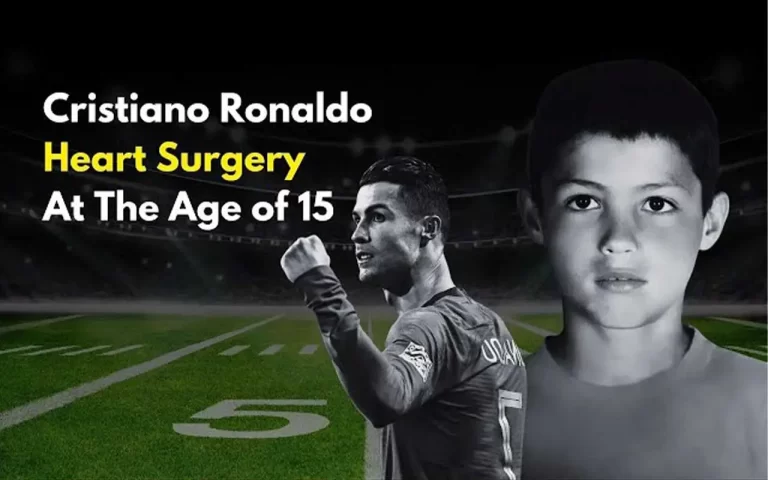Sergio Aguero Heart Problem-Cardiologist Says A Varis Could Be Behind The Which Caused Early Retirement

Sergio Aguero Heart Condition
Sergio Aguero Heart, an esteemed football player, announced his retirement from professional sports due to a heart condition that has been plaguing him. This news has sparked curiosity and concern among fans, athletes, and medical professionals alike. In order to gain a better understanding of Aguero’s heart condition, it is crucial to delve into the intricacies of this medical ailment that has forced an early end to the player’s illustrious football career.

Heart conditions, such as the one Aguero has been diagnosed with, are not uncommon in the realm of professional sports. These conditions can manifest in various ways and impact an athlete’s performance and overall well-being. Given the strenuous demands of football, it comes as no surprise that cardiac health is a topic of utmost importance in the sporting community. In light of Aguero’s retirement, it is vital to explore the nature of his heart condition and its potential implications not only for his own life but also for the wider world of football.
The Potential Link Between a Virus and Aguero’s Heart Problems
In recent years, there has been increasing evidence suggesting a potential link between viral infections and heart problems in athletes. This has led researchers to investigate whether Sergio Aguero’s heart condition may have been triggered by a viral infection. While the exact cause of Aguero’s arrhythmia is still unknown, several studies have shown that certain viruses can invade the heart muscle and disrupt its normal functioning, leading to the development of various cardiac abnormalities.
One notable study conducted by a team of cardiologists found that athletes who had experienced a viral illness were more likely to develop cardiac abnormalities compared to those who had not. This raises the possibility that Aguero, who suffered from a severe flu-like illness in 2020, may have been more susceptible to developing heart problems due to his viral infection. However, it is important to note that this connection is still being explored, and further research is needed to establish a definitive link between viral infections and the development of heart conditions in athletes like Aguero.
Importance of Cardiology in Professional Sports
As professional sports continue to push boundaries and reach new levels of athleticism, the significance of cardiology in ensuring the health and well-being of athletes can’t be emphasized enough. Cardiology plays a pivotal role in identifying, treating, and preventing potentially life-threatening heart conditions that could hamper an athlete’s performance or even lead to tragic consequences.
In the world of professional sports, where physical exertion is a constant demand, cardiology serves as a crucial safeguard. By conducting comprehensive medical assessments, including electrocardiograms, echocardiograms, and stress tests, cardiology experts can detect any abnormalities in an athlete’s heart rhythm, structure, or function.
These assessments provide vital information that helps professional athletes and their medical teams make informed decisions regarding training regimens, competitive participation, and necessary medical interventions. Additionally, cardiology specialists work hand in hand with sports medicine professionals to develop individualized treatment plans that minimize risks and maximize performance potential.
Exploring the Causes Behind Sergio Aguero’s Heart Condition
One of the major factors that could have contributed to Sergio Aguero’s heart condition is the prevalence of viral infections among athletes. Many studies have shown that certain viruses can directly affect the heart muscle, leading to inflammation and potential long-term damage. Sergio Aguero heart problems could be a result of a viral infection that he acquired during his career. However, further research and diagnostic tests would be required to conclusively establish this link.
Another potential cause of Sergio Aguero heart condition is a genetic predisposition. Some individuals are born with certain genetic mutations that make them more susceptible to developing heart problems, such as arrhythmias or structural abnormalities. It is possible that Aguero may have inherited such a genetic variation, which could have increased his risk of experiencing cardiac issues. Genetic testing could provide valuable insights into his condition and help uncover any underlying genetic factors that might have played a role.
Heart Arrhythmia: Contribute to Aguero’s Early Retirement
Heart Arrhythmia, a condition characterized by an irregular heartbeat, has been a topic of discussion surrounding Sergio Aguero’s early retirement from professional football. While there are no conclusive statements linking heart arrhythmia directly to Aguero’s retirement, it is worth exploring the potential impact of this condition on his career.

Heart arrhythmia is a condition that affects the electric impulses of the heart, causing an irregular heartbeat. This irregularity can lead to a variety of symptoms, including dizziness, shortness of breath, and fatigue. For athletes like Aguero, whose physical demands on the body are immense, these symptoms can significantly impact performance and overall well-being.
If left unmanaged, heart arrhythmia can potentially lead to more serious complications, making it essential for athletes to prioritize their cardiovascular health. While it remains uncertain whether heart arrhythmia directly contributed to Aguero’s early retirement, it is clear that this condition could have played a role in his decision-making process.
Notable Cases: Footballers Retired Due to Heart Conditions
Retirement from professional sports is a decision that no athlete takes lightly, and when it is due to a heart condition, the impact is even more significant. Throughout the years, several footballers have been forced to leave the game they love because of heart-related issues. One notable case is Fabrice Muamba, who suffered a cardiac arrest during a match in 2012. Luckily, quick medical intervention saved his life, but it marked the end of his football career. Another well-known example is Antonio Puerta, a talented Sevilla player who sadly passed away in 2007 due to a cardiac arrest during a match, leaving the football world in mourning.
These cases highlight the importance of early detection and prevention when it comes to heart conditions in professional athletes, as an undiagnosed condition can have devastating consequences.
The retirements of Muamba and Puerta sparked conversations and raised awareness about the prevalence of heart conditions in football. It led to important discussions within the sports community regarding the need for regular check-ups, advanced cardiac screening, and increased understanding of warning signs.
These cases also shone a light on the importance of implementing cardiopulmonary resuscitation (CPR) training and having defibrillators readily available in all stadiums and training grounds, which can potentially save lives in the event of a heart-related emergency. As the world of sports continues to invest in the health and well-being of athletes, the number of retired footballers due to heart conditions can hopefully be minimized, ensuring a safer environment for future generations of players.
Unraveling the Mystery: Led to Aguero’s Shortness of Breath
Sergio Aguero’s recent retirement from professional football has left many fans wondering about the underlying causes that led to his recurring episodes of shortness of breath. While the exact reasons are still being investigated, medical experts have suggested that Aguero’s condition may be linked to his history of heart problems. It is believed that a combination of factors, such as a viral infection and a preexisting heart arrhythmia, may have contributed to his respiratory difficulties on the field.
The potential connection between a viral infection and Sargio Aguero heart condition can’t be ignored. Viral infections, particularly those affecting the respiratory system, have been known to cause myocarditis, an inflammation of the heart muscle. This condition can weaken the heart and disrupt its normal function, leading to symptoms like shortness of breath.
Aguero’s reported struggles with recurrent respiratory infections throughout his career could have heightened his vulnerability to such complications. Additionally, the presence of a preexisting heart arrhythmia may have placed him at a higher risk for experiencing breathing difficulties during physically demanding activities, like playing football at a professional level.
Sergio Aguero and Maradona: They Related Beyond Football

Sergio Aguero and Diego Maradona may be forever linked in the world of football, but their connection extends beyond the boundaries of the beautiful game. While they aren’t blood relatives, their kinship lies in their Argentinean heritage and the shared love and admiration they have for their country. Both Aguero and Maradona proudly represent Argentina on the international stage and have showcased their exceptional talent to the world.
On a personal level, Aguero has often spoken about the profound impact that Maradona has had on his career and life. Maradona, considered one of the greatest footballers of all time, has served as a mentor and inspiration to Aguero. The legendary striker’s advice and guidance have undoubtedly played a significant role in shaping Aguero’s journey to stardom. Beyond their footballing bond, Aguero and Maradona share a mutual respect and admiration, forging a connection that transcends the boundaries of the football pitch and the sporting world at large.
Although they may not share a familial lineage, Sergio Aguero and Diego Maradona’s connection goes beyond their shared nationality and footballing prowess. Their bond is the result of a shared love for Argentina, a mentor-mentee relationship, and a mutual admiration that has united 2 footballing icons. As the legacy of Maradona lives on through Aguero’s career, their connection remains a testament to the transformative power of football and the enduring impact of one generation on the next.
Shedding Light on the Curability of Arrhythmia
Arrhythmia, an irregular heart rhythm, has received significant attention in recent years due to its impact on athletes like Sergio Aguero. While the condition may sound alarming and career-ending, it is essential to understand that not all types of arrhythmia are permanent or inherently dangerous. In fact, many cases can be effectively managed and even cured with the right approach.
Treatment options for arrhythmia largely depend on the specific type and severity of the condition. For mild cases, lifestyle modifications, such as reducing caffeine intake or managing stress levels, can have a positive impact on managing symptoms. Additionally, medications may be prescribed to regulate the heart’s rhythm and reduce the risk of complications.
In more severe cases, where medication alone may not suffice, advanced interventions like catheter ablation or implantable devices may be considered. These interventions aim to target and correct the underlying cause of the arrhythmia, offering hope for long-term improvement. The curability of arrhythmia, therefore, lies in early detection, personalized treatment plans, and ongoing monitoring to ensure optimal management and quality of life for affected individuals.
Irregular Heartbeat in the Spotlight: Famous Individuals Affected
Irregular heartbeat, or heart arrhythmia, has become a prominent health concern among various famous individuals. While we may perceive athletes and celebrities as invincible, this condition highlights the vulnerability of even the most revered personalities. One notable case is Fabrice Muamba, a former professional footballer, whose sudden collapse on the field due to cardiac arrest shocked the world. Muamba’s experience not only shed light on the seriousness of heart arrhythmia but also emphasized the importance of prompt medical intervention in saving lives.
Another renowned figure affected by irregular heartbeat is Bill Clinton, the former President of the United States. Clinton openly discussed his battle with atrial fibrillation, a common form of arrhythmia, which often lead to palpitations and shortness of breath. His willingness to share his journey raised awareness about heart arrhythmia and encouraged individuals to prioritize their heart health. Clinton’s case also brought attention to the impact of stress and lifestyle factors on heart rhythm disorders, emphasizing the need for a holistic approach to managing these conditions.
Living with Heart Arrhythmia
Heart arrhythmia is a potentially serious condition that affects the rhythm of your heartbeat. It occurs when the electrical signals in your heart are disrupted, causing your heart to beat too fast, too slow, or irregularly. Living with heart arrhythmia can be challenging, but with proper management and a proactive approach, individuals can lead fulfilling lives.

One of the first steps in living with heart arrhythmia is to understand your condition. Educate yourself about the different types of arrhythmias, their causes, and their symptoms. This knowledge will enable you to recognize any changes in your heart rhythm and seek prompt medical attention if needed. It is also important to work closely with a cardiologist who specializes in arrhythmias to develop a personalized treatment plan that suits your condition and lifestyle.
This may involve medications to regulate your heart rhythm, lifestyle modifications such as reducing stress and avoiding triggers, and potentially procedures such as catheter ablation or the implantation of a pacemaker. Regular check-ups and monitoring of your heart’s electrical activity will also be necessary to ensure the effectiveness of your treatment plan.
Preventive Measures: Athletes Protect Their Hearts
One of the key ways athletes can protect their hearts is by implementing a comprehensive cardiovascular screening program. Regular screenings can help identify any existing heart conditions or abnormalities that may put athletes at risk, allowing for timely intervention and appropriate treatment.
These screenings usually involve a thorough medical history review, physical examinations, electrocardiograms (ECGs), and in some cases, more advanced cardiac imaging and stress tests. By prioritizing these screenings, athletes can work towards minimizing the potential risks associated with undetected heart conditions.
In addition to screenings, another crucial preventive measure is the implementation of appropriate training and conditioning programs. Athletes should work closely with qualified trainers and medical professionals to develop training routines that take their individual health and cardiac needs into consideration.
This includes ensuring gradual and progressive conditioning, proper warm-up and cool-down procedures, and monitoring heart rate during exercise. By striking a balance between intensity and rest, athletes can reduce the chances of developing heart-related complications while maximizing their performance on the field.
Future Prospects: Aguero’s Retirement Mean for Other Footballers
The retirement of Sergio Aguero due to his heart condition has raised questions about the future prospects of other footballers. The occurrence of such a high-profile case brings into focus the importance of cardiac health in professional sports. This development serves as a reminder that even the most skilled athletes aren’t immune to the potential risks associated with heart conditions.
It calls for a reevaluation of the preventive measures and monitoring protocols implemented by sports organizations to safeguard the well-being of their players. The impact of Aguero’s retirement on other footballers is yet to be fully understood, but it undoubtedly presents an opportunity for the industry to prioritize the physical health of its athletes and take proactive steps towards ensuring their long-term future in the sport.
The retirement of a renowned player like Aguero may also prompt more extensive research and exploration of heart conditions within the realm of sports. The insights gained from studying such cases can lead to further advancements in the detection, treatment, and management of various heart ailments, not just in football but in other sports as well.
Arguably, the significance of cardiologists in professional sports may be heightened as the medical community seeks to better understand and address the relationship between physical exertion, heart health, and performance. Ultimately, Aguero’s retirement serves as a catalyst for necessary discussions and actions to safeguard the future of other footballers, creating opportunities for improved cardiac care and advancements in sports medicine.






